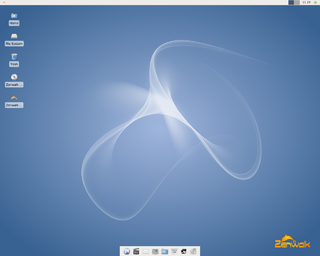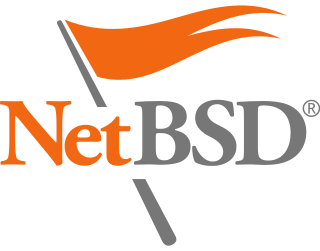
A Linux distribution is an operating system made from a software collection that includes the Linux kernel, and often a package management system. Linux users usually obtain their operating system by downloading one of the Linux distributions, which are available for a wide variety of systems ranging from embedded devices and personal computers to powerful supercomputers.

Xandros, Inc. was a software company which sold Xandros Desktop, a Linux distribution. The name Xandros was derived from the X Window System and the Greek island of Andros. Xandros was founded in May 2001 by Linux Global Partners. The company was headquartered in New York City.

MirOS BSD is a free and open source operating system which started as a fork of OpenBSD 3.1 in August 2002. It was intended to maintain the security of OpenBSD with better support for European localisation. Since then it has also incorporated code from other free BSD descendants, including NetBSD, MicroBSD and FreeBSD. Code from MirOS BSD was also incorporated into ekkoBSD, and when ekkoBSD ceased to exist, artwork, code and developers ended up working on MirOS BSD for a while.

FreeSBIE is a live CD, an operating system that is able to load directly from a bootable CD with no installation process or hard disk. It is based on the FreeBSD operating system. Its name is a pun on frisbee. Currently, FreeSBIE uses Xfce and Fluxbox.

This is a list of operating systems specifically focused on security. Operating systems for general-purpose usage may be secure without having a specific focus on security.

PCLinuxOS, often shortened to PCLOS, is an x86-64 Linux distribution, with KDE Plasma Desktop, MATE and XFCE as its default user interfaces. It is primarily free software operating system for personal computers aimed at ease of use. It is considered a rolling release.

Kurumin Linux was a Live CD operating system based on Debian. Its main features are the advanced hardware auto-detection and a Portuguese user interface, and its main goal is ease of use. As of release 7.0, the size of the disk image is approximately 603 MB.

Scientific Linux (SL) is a discontinued Linux distribution produced by Fermilab, CERN, DESY and by ETH Zurich. It is a free and open-source operating system based on Red Hat Enterprise Linux.

TrueOS is a discontinued Unix-like, server-oriented operating system built upon the most recent releases of FreeBSD-CURRENT.

Zenwalk GNU/Linux is a desktop-focused Linux distribution founded by Jean-Philippe Guillemin. It is based on Slackware with very few modifications at system level making it 100% compatible with Slackware. It aims to be a modern, multi-purpose Linux distribution by focusing on internet applications, multimedia and programming tools. It comes with many specialized tools and is designed for beginner through advanced users, as it offers system configuration via both graphical tools and the command line.
There are a number of Unix-like operating systems based on or descended from the Berkeley Software Distribution (BSD) series of Unix variant options. The three most notable descendants in current use are FreeBSD, OpenBSD, and NetBSD, which are all derived from 386BSD and 4.4BSD-Lite, by various routes. Both NetBSD and FreeBSD started life in 1993, initially derived from 386BSD, but in 1994 migrating to a 4.4BSD-Lite code base. OpenBSD was forked from NetBSD in 1995. Other notable derivatives include DragonFly BSD, which was forked from FreeBSD 4.8, and Apple Inc.'s iOS and macOS, with its Darwin base including a large amount of code derived from FreeBSD.

FreeBSD is a free and open-source Unix-like operating system descended from the Berkeley Software Distribution (BSD), which was based on Research Unix. The first version of FreeBSD was released in 1993. In 2005, FreeBSD was the most popular open-source BSD operating system, accounting for more than three-quarters of all installed and permissively licensed BSD systems.
GNU variants are operating systems based upon the GNU operating system. According to the GNU project and others, these also include most operating systems using the Linux kernel and a few others using BSD-based kernels.

MidnightBSD is a free Unix, desktop-oriented operating system originally forked from FreeBSD 6.1, and periodically updated with code and drivers from later FreeBSD releases. Its default desktop environment, Xfce, is a lightweight user friendly desktop experience.

GhostBSD is a Unix-like operating system based on FreeBSD, with MATE as its default desktop environment and an Xfce-desktop community based edition. It aims to be easy to install, ready-to-use and easy to use. The project goal is to combine security, privacy, stability, usability, openness, freedom and to be free of charge.

NetBSD is a free and open-source Unix operating system based on the Berkeley Software Distribution (BSD). It was the first open-source BSD descendant officially released after 386BSD was forked. It continues to be actively developed and is available for many platforms, including servers, desktops, handheld devices, and embedded systems.

Tails, or "The Amnesic Incognito Live System," is a security-focused Debian-based Linux distribution aimed at preserving privacy and anonymity. It connects to the Internet exclusively through the anonymity network Tor. The system is designed to be booted as a live DVD or live USB and leaves no digital footprint on the machine unless explicitly told to do so. It can also be run as a virtual machine, with some additional security risks. The Tor Project provided financial support for its development in the beginnings of the project, and continues to do so alongside numerous corporate and anonymous sponsors.















